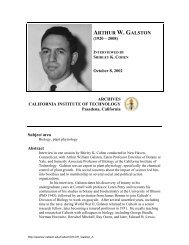Interview with Thomas A. Tombrello - Caltech Oral Histories
Interview with Thomas A. Tombrello - Caltech Oral Histories
Interview with Thomas A. Tombrello - Caltech Oral Histories
Create successful ePaper yourself
Turn your PDF publications into a flip-book with our unique Google optimized e-Paper software.
<strong>Tombrello</strong>–13<br />
truly bigger than life. After the book The Godfather came out, my father used to kid Frank about<br />
being the godfather. After he read the book, I believe Uncle Frank took on some of its<br />
characteristics. He dressed in a more flamboyant style. I think he was no more into illegal<br />
things than other people in the construction business, which is a business known for buying<br />
influence and figuring out ways to get contracts that maybe one shouldn’t look at too closely.<br />
But I don’t think he was any different than other people in that business. You think of Kellogg<br />
Brown & Root or perhaps the Bechtel Corporation and some of the things they did on a bigger<br />
scale. To bring in Lyndon Johnson again, in Texas we used to call him “the senator from Brown<br />
& Root.” I think the construction business exists because you can get state and government<br />
contracts. If people in the business play fast and loose <strong>with</strong> that, I think that’s part of trade. We<br />
all enjoyed the continuing story of that when we were watching what was happening in Iraq <strong>with</strong><br />
Kellogg Brown & Root.<br />
Well, by 1947, we had had one year in Birmingham, and my father got an offer to come<br />
back to the H. L. Green Company. He could either have taken the store in Hempstead, Long<br />
Island, or the store in Fort Worth, and going back to Texas was obviously a high priority. The<br />
Fort Worth store was not finished. While it was being built, he was doing his ordering out of the<br />
Dallas store, which was thirty miles away. So we lived in Fort Worth, but Dad was commuting<br />
to Dallas. Then somebody died in the company and everybody moved up a notch. My father got<br />
the Dallas store, which was the biggest store in the company, and we moved to Dallas. At that<br />
point, I was in the sixth grade, discovering that the schools in Dallas were not as good as the<br />
schools in Fort Worth, where they were really excellent, or I thought so anyway. For once in my<br />
life, in Fort Worth, I actually enjoyed school—for three months.<br />
ASPATURIAN: I have a question. It sounds like you spent most of your youth in the South at a<br />
time when it was still segregated. Did this affect your life at all? Was there much awareness of<br />
it?<br />
TOMBRELLO: Oh, there was awareness. Everything was segregated. Separate drinking<br />
fountains, all that sort of thing. I was a typical Southern kid, who because he didn’t know<br />
anything else believed in segregation, though it was tempered by the fact that my father ran a<br />
variety store, and I would say it was heavily, heavily dependent on the African American<br />
http://resolver.caltech.edu/<strong>Caltech</strong>OH:OH_<strong>Tombrello</strong>_T

















